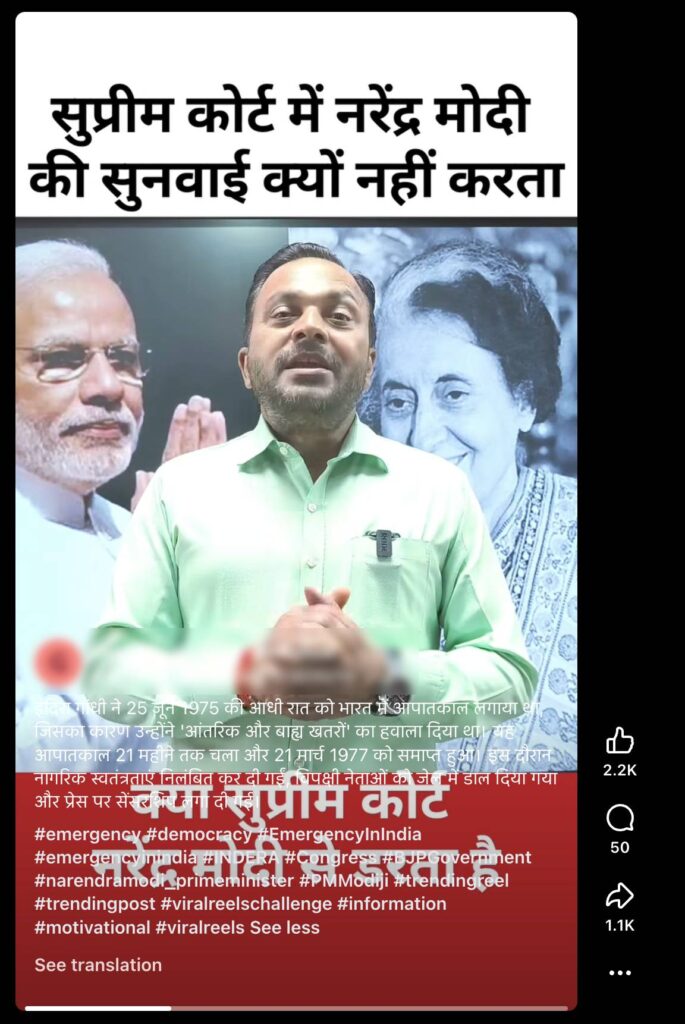The Prime Minister of India does not have any immunity from prosecution while in office
A video is going viral on social media claiming that the Prime Minister of India has special immunity from civil or criminal proceedings while in office. The video further alleges that this immunity against prosecution by any court was introduced during Indira Gandhi’s tenure as PM in 1975. Through this article, let us fact-check the claim made in the post.

Claim: The Prime Minister of India has special immunity from civil or criminal proceedings while in office.
Fact: The Prime Minister of India does not enjoy any special immunity from civil or criminal proceedings while in office. Only the President and the Governors are granted constitutional immunity under Article 361 of the Constitution. On 25 June 1975, a National Emergency was declared in India. During this period, Indira Gandhi’s government passed the 39th Constitutional Amendment, which placed the elections of the Prime Minister and the Speaker outside the scope of judicial review by inserting a new Article 329A. However, Article 329A, which had been added by the 39th Constitutional Amendment, was declared unconstitutional in the landmark Indira Nehru Gandhi v. Raj Narain (1975) case on 07 November 1975. The Supreme Court held that this provision violated the basic structure of the Constitution by removing the jurisdiction of courts over election disputes involving the Prime Minister and the Speaker. The 39th Constitutional Amendment was subsequently repealed by the 44th Constitutional Amendment in 1979, which amended Article 329 and omitted Article 329A from the Constitution. Hence the claim made in the post is MISLEADING.
To verify the claims made in the video, we referred to the Constitution of India. However, we did not find any article or clause that provides the Prime Minister of India with special immunity from prosecution by any court. According to the Constitution of India, only the President and the Governors are granted constitutional immunity under Article 361. Article 361 states that the President and the Governors are not answerable to any court for the exercise of their powers and cannot be arrested or prosecuted while in office.
On 12 June 1975, Justice Jagmohanlal Sinha of the Allahabad High Court ruled that the then Prime Minister, Indira Gandhi, had misused government machinery during her 1971 Lok Sabha election campaign. The court found her guilty under the Representation of the People Act, 1951, and disqualified her from holding any elected office for six years. The case had been filed by Raj Narain, the socialist leader who had contested against Mrs Gandhi in Rae Bareli. His legal challenge resulted in this landmark verdict. The Supreme Court subsequently granted a conditional stay, allowing Mrs Gandhi to remain Prime Minister and attend Parliament, though she was barred from voting.
Following this, on 25 June 1975, a National Emergency was declared in India. During this period, Indira Gandhi’s government passed the 39th Constitutional Amendment, which placed the elections of the Prime Minister and the Speaker outside the scope of judicial review. The amendment received Presidential assent on 10 August 1975 and inserted a new Article 329A into the Constitution. Clause (4) of this article stated that the elections of the President, Vice-President, Prime Minister, and Speaker of the Lok Sabha could not be questioned in any court of law. Instead, Parliament would determine the “special authority” empowered to decide such disputes.
The validity of the 39th Amendment was immediately challenged in the Supreme Court in the case of Indira Nehru Gandhi v. Raj Narain (1975). On 7 November 1975, the Supreme Court, relying on the Basic Structure Doctrine established in the Kesavananda Bharati case (1973), struck down Clause (4) of the newly inserted Article 329A.
The 39th Constitutional Amendment was subsequently repealed by the 44th Constitutional Amendment in 1979, which amended Article 329 and omitted Article 329A from the Constitution.
To sum it up, the Prime Minister of India does not enjoy any special immunity from civil or criminal proceedings while in office. Only the President and Governors have constitutional immunity under Article 361.